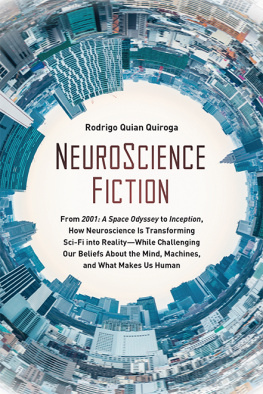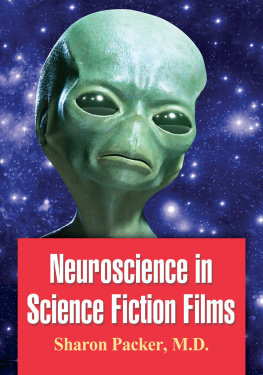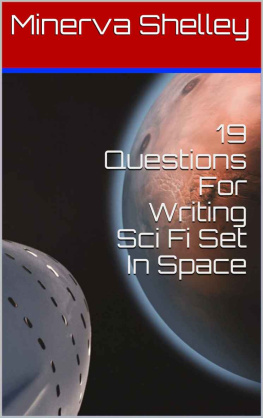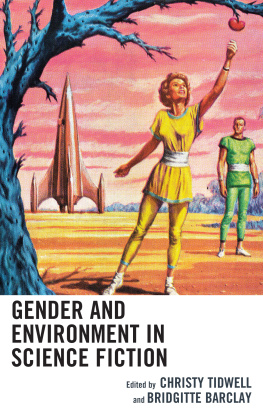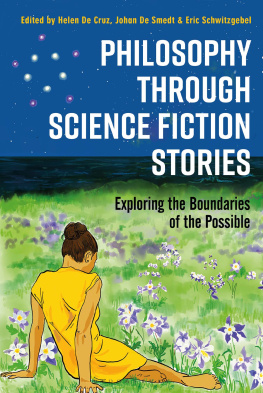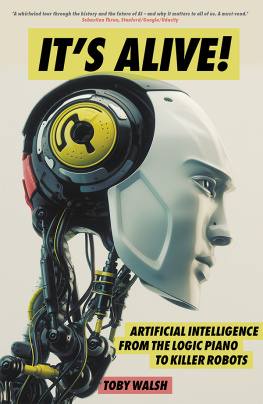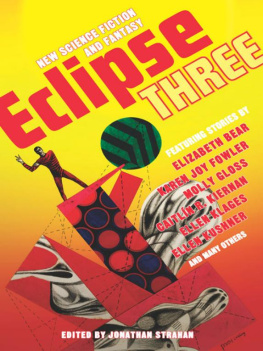Table of Contents
Guide
Praise for NeuroScience Fiction
If you like science fiction, this book is for you, but if you like science and fiction, then this is certainly your book. Intelligent and well informed.
Antonio Damasio, director of the Brain and Creativity Institute, University of Southern California, and author of Descartes Error and The Strange Order of Things
This exceptional book, based on neuroscientific facts, beautifully links philosophy, literature, and fiction, and brings to mind the expressive inscription on the frieze of the Alte Oper in Frankfurt, Dem Wahren, Schnen, Guten (To the true, the beautiful, the good). Rodrigo Quian Quiroga has written a thorough, provocative answer to the deep philosophical question of what makes us human. His truly remarkable book blends art, science, and philosophy as seen through the highly original lens of brain research and movies.
Gustavo Deco, ICREA professor, director of the Center for Brain and Cognition, Theoretical and Computational Group, Universitat Pompeu Fabra, Barcelona
Of all of Mother Natures magic tricks, the conjuring of conscious sensations, thoughts, and feelings from a small vat of cells is arguably the most wondrous of all. For a long time, Descartes told us the recipe was lost. But now, renowned cognitive neuroscientist Rodrigo Quian Quiroga invites us on an exhilarating journey, in which the motley trio of neuroscience, philosophy, and Hollywood together seek after the recipe of the mind. Quian Quiroga, who himself discovered what is sure to be an essential ingredient, the concept cells, shows us how frighteningly close we are getting and how huge the stakes are.
Doris Y. Tsao, neuroscientist and professor of biology at the California Institute of Technology
This book is a fascinating journey across some of the most influential science-fiction movies that deal with the deepest questions in neuroscience and philosophy of mind. Only a Renaissance man like Rodrigo Quian Quiroga could find these deep connections between fiction and human nature and show how they are becoming reality.
Jose M. Carmena, professor of electrical engineering and neuroscience, University of California, Berkeley
Science-inspired fiction hooks so many of us because of what it has to say about our immediate potentialboth for greatness and for decline. NeuroScience Fiction will be a treat for sci-fi movie fans and anyone who has wondered just how close we are to the horizon technologieswhich is often much closer than we realize.
James H. Fallon, professor at the Department of Psychiatry and Human Behavior, University of California, Irvine, and bestselling author of The Psychopath Inside


NeuroScience Fiction copyright 2020 by Rodrigo Quian Quiroga
All rights reserved. No part of this book may be used or reproduced in any manner whatsoever without written permission of the publisher, except in the case of brief quotations embodied in critical articles or reviews.
Originally published in Spanish as NeuroCienciaFiccin: Cmo el cine se adelant a la ciencia in 2018 by Penguin Random House Grupo Editorial, S.A. Copyright 2018 by Rodrigo Quian Quiroga.
Chapter opening illustrations by Candela Insua
Translation by Cecilia Molinari

BenBella Books, Inc.
10440 N. Central Expressway, Suite 800
Dallas, TX 75231
www.benbellabooks.com
Send feedback to
BenBella is a federally registered trademark.
First E-Book Edition: April 2020
Library of Congress Control Number: 2019054170
ISBN 9781950665051 (print)
ISBN 9781950665228 (electronic)
Editing by Laurel Leigh and Alexa Stevenson
Copyediting by Scott Calamar
Proofreading by Jenny Bridges and Lisa Story
Indexing by WordCo Indexing Services, Inc.
Text design and composition by Aaron Edmiston
Cover design by Sarah Avinger
Cover photo Shutterstock / metamorworks
Printed by Lake Book Manufacturing
Distributed to the trade by Two Rivers Distribution, an Ingram brand www.tworiversdistribution.com
Special discounts for bulk sales are available.
Please contact .
For little princess Maia,
and for Rodriguito and Felipe,
her two guardian princes.
CONTENTS
M ovies go far beyond imagining the obvious. They tend to be ahead of their time, proposing disruptive and fascinating scenarios. In Inception, a group of conspirators implant false memories. In Until the End of the World, a crazy scientist is able to read dreams. And in 2001: A Space Odyssey, a supercomputer feels and thinks like a person.
Just as sci-fi movies tend to rely on the latest scientific breakthroughs, science is inspired by the prolific imagination of filmmakers and, years after these blockbusters first appeared in theaters, we find ourselves immersed in those realities. Implanting memories using optogenetics and the resulting possibility of voluntarily manipulating groups of neurons, reading the mind during sleep through advanced decoding algorithms, or getting computers to surpass human thought in infinite tasks through deep neural networks are all achievements that have been described in prestigious scientific journals in recent years.
Thats what this book is about: how science is achieving what decades ago seemed impossible, and how these advances are making us reconsider the big questions that we humans have been asking ourselves for as long as we can remember. In NeuroScience Fiction, I want to share with you what keeps me awake at night, what fascinates me. Our world is experiencing a revolution in neuroscienceso profound, so close to the roots of our own essence, that it feeds off the most transcendental philosophical discussions and, at the same time, so captivating that it has fired up the imagination of futurist writers as an endless source of sci-fi films.
This book is supported by that tripodthree passions that reinforce each other: science fiction, neuroscience, and philosophy. Movies such as 2001, Blade Runner, The Matrix, and Inception, among many others, make us think about human consciousness and an eventual consciousness of machines, as well as the existence of external reality, free will, and the sense of identity that makes us recognize ourselves as people, to attribute to ourselves the notion of a self, and even to consider if one day we could become immortal.
Neuroscience is advancing at an alarming rate, and many of the ideas in these movies are increasingly related to science and less so to fiction. Although it may be hard to believe, implanting a memory, reading the mind, communicating with patients in a coma, predicting a persons decision just seconds before they make it, creating cyborgs, or getting a paralyzed person to walk again are no longer pipe dreams. These are solid and verifiable realities that have stricken us neuroscientists with awe.
I am fortunate enough to have been working in neuroscience for years now and also had the luck of discovering a type of neuron called
Next page
